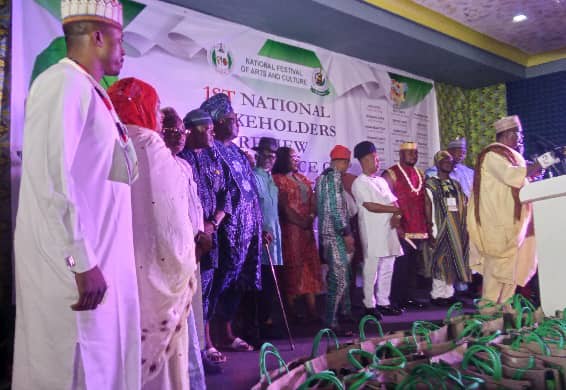2023 NAFEST confab: Economic indices favour culture as game changer for Nigeria

![]()
[By VICTOR NZE]
Crude oil and the gas sector of the economy has continued to dominate the country’s export value, but this is largely due to reluctance of policy makers in the country to effectively exploit the untapped potential firmly domiciled in the culture and arts industry.

NCAC Director-General, Otunba Runsewe with state Commissioners and Directors of Culture/History Bureaux from across the 36 States of the Federation and the Federal Capital Territory (FCT) during the National Stakeholders’ Review Conference on the 35 editions of the National Festival of Arts and Culture (NAFEST), organised by the National Council for Arts and Culture (NCAC) at the Chida Hotel, in Jabi, Abuja
This is the position of the state Commissioners and Directors of Culture/History Bureaux from across the 36 States of the Federation and the Federal Capital Territory (FCT), members of professional associations in the culture sector, the media and the general public who gathered for the recently-concluded four-day National Stakeholders’ Review Conference on the 35 editions of the National Festival of Arts and Culture (NAFEST), organised by the National Council for Arts and Culture (NCAC).
The conference which ran from Tuesday, December 5 through to Friday 8, at the Chida Hotel, in Jabi, Abuja, recommended among others, in its communiqué that Nigerian cultural products should be carefully packaged and aggressively promoted through platforms such as digital marketing, creation of galleries and the participation in travel markets, and others to drive their market value and generate revenue.
This is also as it advocated the immediate creation of skills acquisition training programmes, especially for women, the youths and the physically-challenged through structured processes of formal education, informal and traditional skills transfer, apprenticeship, and others, all geared towards economic empowerment and capacity building for operators in the sector to drive the general economy.
According to the third quarter report released by the National Bureau of Statistics (NBS), Nigeria recorded a 60.78 per cent jump in trade growth recorded compared to the second quarter of 2023.
The NBS report further disclosed that Nigeria’s total trade in the third quarter of 2023 stood at N18,804.29 billion, representing an increase of by 60.78 per cent compared to the second quarter of 2023.
The NBS also disclosed in its recently-published on its website titled; “Foreign Trade in Goods Statistics (Q3 2023) International Trade Reports,” that Nigeria’s exports were valued at N10,346.60 billion while total imports stood at N8,457.68 billion in the third quarter of this year.
“Total exports increased by 60.78% compared to the amount recorded in the second quarter of 2023 (N6,435. 13 billion) as well as by 74.36% compared to the corresponding quarter in 2022 (N5,934.15 billion).
“Also, petroleum oils formed the largest export value in the third quarter of 2023,” the NBS report said.
“Petroleum oils and oils obtained from bituminous minerals, crude’ with N8,535.61 billion representing 82.50% this was followed by ‘Natural gas, liquefied’ with N1,016.45 billion accounting for 9.82%, and ‘Urea, whether or not in aqueous solution’ with N109.68 billion or 1.06% of total exports.”
According to the NBS report, total imports increased by 47.70 per cent compared to the value recorded in the second quarter of 2023 (N5,726.25 billion) and by 33.33 per cent when compared to the value recorded in the corresponding quarter of 2022 (N6,343.53 billion), the report added.
According to the NBS, the significant rise in exports and imports in the third quarter of 2023 compared to the preceding and corresponding quarters was largely driven by an increase in trade activities within the period.
Meanwhile, data on Imports in the third quarter of 2023 reveals that the top five partner countries of origin for imports to Nigeria were: China (N1,973.34 billion or 23.33%); Belgium with N996.65 billion or 11.78%; India with N802.07 billion or 9.48 per cent; Malta with N561.37 billion or 6.64 per cent; and the United States of America with N502.92 billion or 5.95 per cent of total imports.
Furthermore, the value of re-export stood at N35.95 billion representing 0.35% of total exports in Q3, 2023, as crude oil remained the highest trading commodity in the third quarter of 2023.
The NBS report further indicated that Ivory Coast, Gabon, Ghana, Cameroon, and South Korea were the top five re-export destinations for Nigeria, respectively.
For export, the report said analysis by trading partners in Q3, 2023, shows that Spain recorded the highest exports from Nigeria with a value of N1,274.07 billion or 12.31 per cent of the country’s total exports.
“This was followed by India with N1,015.13 billion or 9.81%, The Netherlands with N988.66 billion or 9.56%, Indonesia with N758.59 billion or 7.33%, France with N720.45 billion or 6.96% of total exports.
Altogether, exports to the top five countries amounted to 45.98% of the total value of exports.
Furthermore, according to the NBS report for Q1, 2022, the non-oil sector grew by 6.08 per cent in real terms during the period under review, but the growth recorded was driven largely by the Information and Communication (Telecommunication); Trade; Financial and Insurance (Financial Institutions); Agriculture (Crop Production); and Manufacturing (Food, Beverage & Tobacco), accounting for positive GDP growth.
“This rate was higher by 5.28% points compared to the rate recorded same quarter of 2021 and 1.34% points higher than the fourth quarter of 2021.
“In real terms, the non-Oil sector contributed 93.37% to the nation’s GDP in the first quarter of 2022, a figure higher than the share recorded in the first quarter of 2021 which was 90.75% and lower than the fourth quarter of 2021 recorded as 94.81%,” the NBS reported.
However, despite its seeming neglect, the country’s Arts, Entertainment and Recreation sector for the same period of Q1, 2022 under review, in nominal terms, registered a growth increase of 15.01% in the first quarter 2022 (year-on-year), representing a rise of 10.07% points relative to the preceding quarter growth rate of 4.94% and an increase of 15.48% points compared with the year earlier growth rate of -0.47%.
“On a quarterly basis, growth was recorded at 44.33%, higher than the quarter-on-quarter growth of Q4 2021 recorded at 17.65%.
“The activity contributed 0.23% to the total nominal GDP in the first quarter of 2022. This contribution was slightly higher than the 0.22% it contributed in Q1 2021 and higher than the 0.14% it contributed in Q4 of 2021.
“In real terms, the activity grew by 2.30% year-on-year which was more than the rate recorded in Q1 2021 by 3.43% points, and less by 2.01% points when compared with that of the preceding quarter. Quarter-on-Quarter, growth stood at 28.94% in real terms.
“Overall, Art, Entertainment and Recreation contributed 0.30% to real GDP in Q1 2022, relatively the same as the 0.30% recorded in 2021 and higher than 0.20% recorded in the fourth quarter of 2021,” the NBS report stated.
From the facts and figures recorded by the NBS, the arts and culture is clearly low on the revenue chart of the government, but still registered a place in terms of returns.
According to the National Council for Arts and Culture (NCAC) Director-General, Otunba Runsewe, while speaking at the opening of the conference, the culture sector in Nigeria has the proven capacity to drive the economic diversification and sustainability drive of the Federal Government and further contribute significantly to the Gross Domestic Product (GDP) of the country, if effectively harnessed.
Delivering his welcome address at the opening of the four-day National Stakeholders’ Review Conference on the 35th Anniversary of the National Festival of Arts and Culture (NAFEST) held at the Chida Hotel, in Jabi, Abuja, Wednesday, December 6, Otunba Runsewe opined that his position is against the backdrop of the fact that Nigeria ‘is unarguably one of the most culturally diverse nations in Africa, rich in various cultural products,’ adding that the sector can be developed to drive a robust cultural industry.
“In view of the proven capacity of the cultural sector to contribute significantly to the Gross Domestic Product (GDP), most nations of the world are developing strategies to integrate and mainstream cultural products to the process of economic development, Nigeria is unarguably one of the most culturally diverse nations in Africa, rich in various cultural products.
“It offers a unique opportunity for artistry, craftsmanship and entrepreneurial skills that can be developed, showcased and marketed to drive a robust cultural industry. A rich cultural industry in Nigeria will no doubt speed up our diversification drive, engender rapid socio-economic growth and development and lead to a strong and stable Nigerian currency at the international market,” Runsewe said.
It is against this backdrop therefore, that the communiqué issued at the end of a four-day National Stakeholders’ Review Conference on the National Festival of Arts and Culture (NAFEST) organised by the National Council for Arts and Culture (NCAC) becomes even more expedient.
The conference itself was convened to evaluate the past 35 editions of the NAFEST with a view to assessing its strength and weaknesses, as well as, how it has fulfilled its goals of uniting the nation as well articulate strategies for improving on its content and form.
It was also tasked with evolving a policy framework for aligning NAFEST with the Renewed Hope Agenda of the President Bola Tinubu administration; enhance the visibility of the culture sector and reposition it as a key player in the nation’s economy; set agenda for the State Art Councils/History Bureaux on development of craft markets in the states, emphasizing the development of one iconic cultural product in which they have comparative advantage.
It was tasked with exploring avenues for funding assistance and partnerships for operators in the industry, platforms available for international cultural exchanges and training programmes, and others, packaging, marketing and promotion of Nigerian arts for value addition, evolve a national blueprint for uniformly driving the Arts, Culture and the Creative Industry sector to engender employment generation and wealth creation, and galvanizing the socio-economic growth of Nigeria.
A timely communiqué issued at the end of the conference side harping on creation of skills acquisition programmes spread across the states of the federation, drew attention to the need to fill the marketing gaps in the country’s cultural products, especially by carefully packaging and aggressively promoting them through platforms such as digital marketing, creation of galleries and the participation in travel markets, and others.
This is also as it identified the imperative of encouraging states to develop one unique product in which they have comparative advantage will enable the states package and market the iconic product, attract investors, increase internally generated revenue, enhance public – private – partnership and reduce unemployment.
“Cultural exchange programmes can engender unity in diversity, promote international diplomacy for peace, enhance the cross-fertilization of ideas and promote international trade. There should be structured international exchange programmes and synergy between local and international NGOs to facilitate this process. Funding for this could be sourced from government subventions, self-sponsorship, local and international donor agencies, among others.
“The importance of cultural markets in the states as a means of employment and wealth creation, preservation of the rich cultural heritage of Nigeria and the establishment of one-stop-shop for cultural products. Therefore, the establishment of cultural markets in the states to be domiciled in Ministry of Culture and Tourism is strongly recommended.
“The conference identified sources of funding of the culture sector to include government, the private sector, multinational organizations, development partners, donor agencies, charity organizations and lamented that government has never taken a deliberate step to fund the culture sector. It was, therefore, recommended that these sources of funding should be explored by the states while stakeholders like Nigeria Association of Tour Operators (NATOP), National Association of Nigeria Travel Agencies (NANTA), Radio, Television, Theatre and Arts Workers’ Union of Nigeria (RATTAWU), and. should work with relevant cultural agencies of government to mount sustained advocacy in order to push for the implementation of the National Endowment Fund for Arts. To achieve this, industry players must work together, and embark on programmes that will not only make them relevant, but indispensable stakeholders in the task of nation building.
“The conference recommended that culture and tourism should remain as one Ministry both at the Federal and State levels to complement each other and contribute meaningfully to the diversification efforts of government and the Gross Domestic Product (GDP) of the nation.
“The conference observed that leveraging technology and e-marketing presents a pivotal opportunity to project the culture sector to higher height. Consequently, it was recommended that the sector should develop marketing mindset, ensure adequate marketing of identified cultural products to attract relevant funding. Identified products should be properly packaged for presentation and sellability at the local and international market place. Accordingly, states are encouraged to take advantage of e-marketing opportunities offered by ALEPH and CLEVENARD and other relevant social media platforms.
“The National Festival of Arts and Culture (NAFEST), a flagship programme of the National Council for Arts and Culture remains a veritable platform for fostering national unity, peace, mutual understanding and cooperation among Nigerians, irrespective of ethnic group, culture, creed, tribe or tongue. It should, therefore, be sustained and strengthened.
“NAFEST should be developed to the status of a festival that needs no introduction and which encompasses all-year-round activities.
“The festival should target different relevant audience such as Diaspora Community, members of the academic community and the tourism sector, etc.
“Programmes which can boost economic activities in the states should be introduced into the festival in a way that missing the hosting of the festival by a state would amount to missing a life-time economic opportunity,” the communiqué read.
Meanwhile, the participants also hailed the leadership role of Otunba Runsewe , Director General of the NCAC for ‘bringing his wealth of knowledge, dynamism and innovation to bear on galvanizing the sector to greater visibility and development,’ and also for evolving the First National Stakeholders’ Review Conference on NAFEST after 35 editions to enable stakeholders interact, brainstorm and articulate a blue print for successfully driving the sector.
A total of three papers were presented at the plenary session which included: ‘Culture As a Tool For Revamping the Economy: An Agenda Setting,’ presented by the NCAC boss, Otunba Olusegun Runsewe (OON); ‘E-Marketing Cultural Content Beyond Borders,’ by Mrs. Franca Idemudia of the Clevenard Global Media International, and another presentation titled; ‘Explore, Understand, and Appreciate Nigeria Culture Through Photography,’ by Mr. Ade Dayo.




